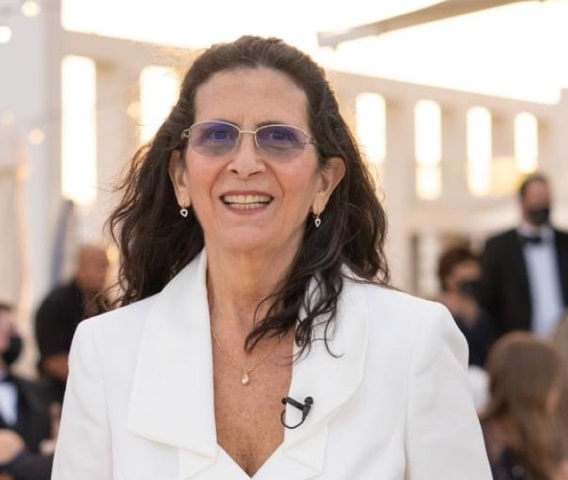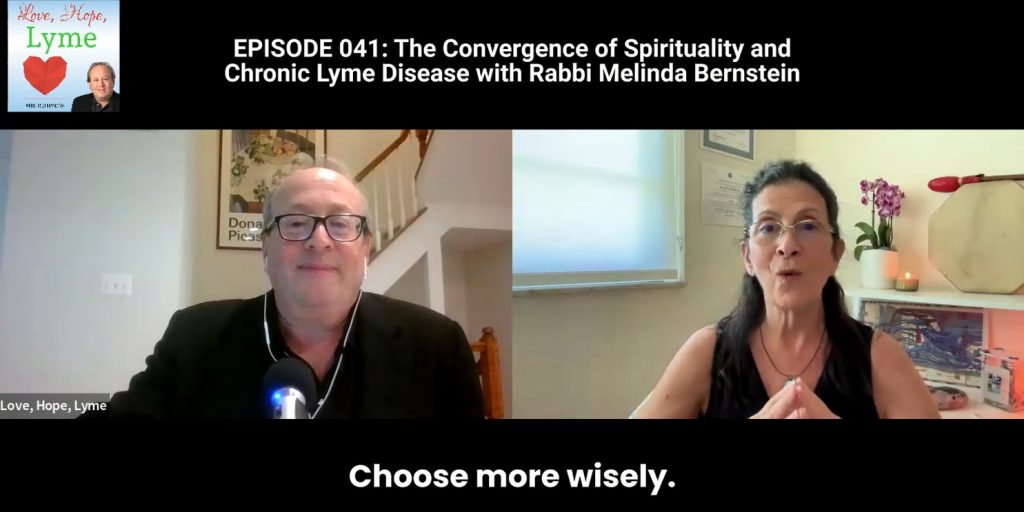PODCAST: Finding spiritual strength in the face of Lyme disease

By Fred Diamond
On the latest Love, Hope, Lyme Podcast episode, I sat down with Rabbi Melinda Bernstein, a resilient Lyme survivor and practicing rabbi.
We explored the profound challenges and spiritual questions that arise when battling chronic Lyme disease and its relentless co-infections.
When researching my book, “Love, Hope, Lyme: What Family Members, Partners, and Friends Who Love a Chronic Lyme Survivor Need to Know,” I encountered many Lyme survivors and caregivers grappling with their faith. Some found comfort and commitment in their beliefs, while others experienced doubt.
Chronic Lyme disease presents not only physical challenges but also profound emotional and spiritual trials.
Rabbi Melinda’s personal experience with Lyme offers a unique perspective on the convergence between chronic illness and spirituality. Her journey highlights how spirituality can provide solace, purpose, and resilience in the face of an illness that disrupts the very fabric of daily life.
Finding support and divine signs along the way
After experiencing exhaustion and adrenal burnout caused by the Lyme, Rabbi Melinda described a moment of guidance, a divine nudge, as she calls it. She discovered a local healing center and interpreted it as “a sign from God that I needed to go there.”
At this point, her journey shifted from traditional treatments to a more holistic approach, one that harmonizes spiritual and physical well-being.
She also touches on the symbolic lessons Lyme disease offers, noting that “the tick has a purpose, just as we do.” This perspective, she explains, emphasizes the importance of detachment and letting go, drawing on the idea that even seemingly negative elements, like the tick, can teach us valuable spiritual lessons.
Lyme teaches her to release control and expectations, a philosophy that underpins much of her healing journey.
The spiritual ROAD to healing
To navigate the challenges of Lyme disease, Rabbi Bernstein relies on a framework she calls ROAD—a spiritual approach to healing that includes Responsibility, Openness, Awareness, and Discipline. This roadmap is not only for herself but something she offers to others as a tool for healing.
- Responsibility: Taking ownership of one’s health and mindset is essential. “I took responsibility for letting go of what other people thought of me,” Bernstein shares. For her, responsibility means releasing judgments and focusing on what she can control, rather than trying to meet others’ expectations.
- Openness: Rabbi Bernstein emphasizes the need to stay open to new ideas and treatments, even when they deviate from the norm. “Should I try this? Should I do that? Maybe this works, maybe it doesn’t work,” she muses. This willingness to explore is essential in finding what resonates personally, as healing journeys often require experimentation and flexibility.
- Awareness: Chronic illness sharpens awareness, as it requires ongoing self-monitoring and reflection. “If something doesn’t feel right in my body, in my mind, and my soul, then I got to go back to taking responsibility,” she explains. This heightened self-awareness helps her stay attuned to her needs, enabling her to make adjustments as her body and spirit change over time.
- Discipline: Finally, discipline, discernment, and determination form the backbone of Rabbi Bernstein’s roadmap. “Get yourself a coach or somebody that can see your higher vision,” she advises. Having a guide or mentor helps her stay committed to the path, reinforcing the discipline needed to persist in her healing journey.
This framework, she says, is integral to maintaining spiritual and physical resilience, especially when illness becomes an overwhelming force.
The journey to redemption: finding grace in adversity
Rabbi Melinda speaks of a “journey to redemption,” which she views as a path to self-worth, self-acceptance, and trust in divine timing. She encourages those on similar paths to “allow space and time and God’s timeline,” as the healing journey is rarely linear. Chronic illness forces individuals to confront their limitations and release attachments, making space for new growth.
This journey to redemption, she explains, is about finding grace in adversity. She likens it to Shabbat or moments of peace, when one can let go of daily struggles and find solace in faith.
“It’s a self-worth journey, a self-care journey, a self-awareness journey,” she notes. By allowing herself to receive support, she learns that healing is as much about cultivating inner peace as it is about physical recovery.
The symbolic and transformative role of Lyme disease
Rabbi Melinda has learned to see Lyme disease as a spiritual teacher, viewing the tick as a symbol of survival and adaptability.
“The tick teaches us survival, challenging environments, overcoming obstacles,” she explains. This philosophy emphasizes the value of resilience and adaptability in the face of adversity.
By reframing Lyme disease as a teacher, she finds that her suffering holds a purpose. This perspective encourages her to learn from the illness rather than viewing it solely as an affliction. She believes that, just as ticks have a role in the ecosystem, Lyme disease has shaped her personal journey, helping her cultivate patience, strength, and a deeper understanding of life’s interconnectedness.
Finding community and faith amidst chronic illness
Through her work, Rabbi Melinda fosters a community of support and faith, where people with chronic illnesses can come together in empathy and mutual understanding. She stresses the importance of finding someone who can help you see your higher vision and stay focused on your path.
“Get yourself a coach or somebody that can see your higher vision,” she advises, underscoring the value of companionship on the healing journey.
She reflects on how sharing her journey with her family has opened up conversations about Lyme and helped her find understanding and support. This community of loved ones and fellow travelers, she notes, provides a sense of belonging that sustains her during difficult times.
By fostering connections with others who understand the journey, individuals with chronic illness can find empathy, guidance, and a sense of shared strength.
Embracing the challenges of illness and parenthood
When asked about parents of children with Lyme, Rabbi Melinda drew powerful parallels between the trials of raising teenagers and managing the unpredictable journey of chronic illness. “It’s hard enough to raise children,” she notes. “When they’re teenagers, that’s when it gets more rambunctious.”
She compares the rebellious independence of teenagers to the nature of chronic illness, both of which demand patience, resilience, and adaptability. In both cases, she notes, a mother must ask herself, “How am I going to prepare my child for this experience of life?”
For those facing a chronic illness, this question takes on even deeper significance. Chronic illness often forces loved ones into roles as caregivers and disrupts family dynamics.
Rabbi Melinda explores how her journey with Lyme has changed her perspective on caregiving and how it calls for an expanded reservoir of compassion, patience, and spiritual endurance.
Conclusion: faith, love, and Lyme
Rabbi Melinda’s story highlights that healing is a journey, not a destination. Chronic illness, she believes, is not merely a burden but an invitation to embrace faith, love, and resilience. She encourages others to approach their struggles with patience and an open heart, allowing themselves to grieve, grow, and find meaning in each step.
As she puts it, “You’ve got to allow space and time and God’s timeline.” Her journey reminds those with Lyme and other chronic illnesses that healing encompasses more than physical recovery. It involves spiritual growth, self-discovery, and a renewed faith that life, in all its complexities, holds purpose and beauty.
Chronic Lyme disease may present formidable challenges, but Rabbi Bernstein’s path shows that through faith, love, and community, one can find light even in the darkest moments.
Her insights inspire a holistic approach to healing, where spirituality, self-compassion, and resilience converge to create a life of meaning, despite the challenges of chronic illness. As she blesses her audience with well-wishes for the holiday season, she offers a powerful reminder: healing is not just about overcoming disease but about embracing every part of the journey with grace, gratitude, and hope.
Click here to listen to all episodes of the Love, Hope, Lyme Podcast or on YouTube.
Melinda Bernstein is a freelance rabbi based in Southeast Florida. Learn more about her at melindabernstein.com.
Fred Diamond is based in Fairfax, Virginia and can be contacted via Facebook. His popular book, “Love, Hope, Lyme: What Family Members, Partners, and Friends Who Love a Chronic Lyme Survivor Need to Know” is available on Amazon. The e-version of the book is always free to Lyme survivors. PM Fred on Facebook or LinkedIn for your copy.





















We invite you to comment on our Facebook page.
Visit LymeDisease.org Facebook Page